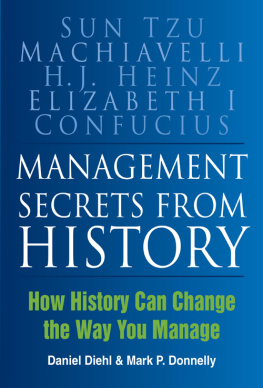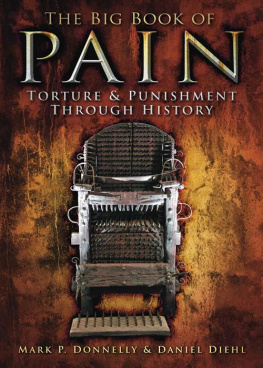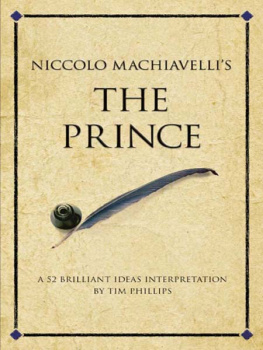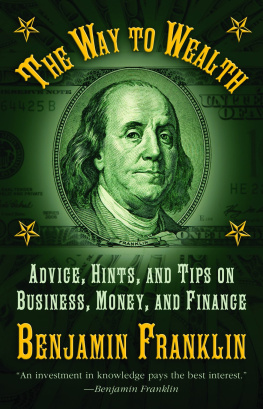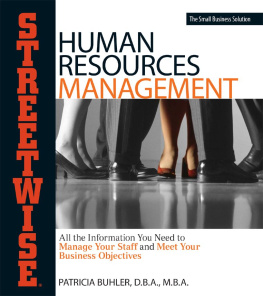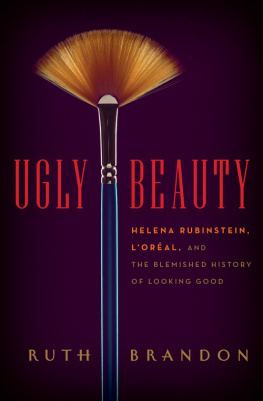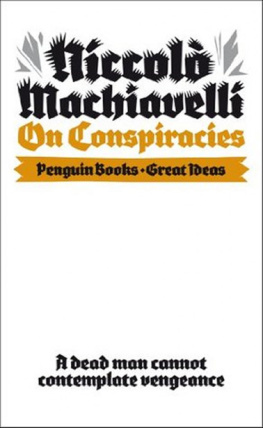SUN TZU
MACHIAVELLI
HJ HEINZ
ELIZABETH I
CONFUCIUS
MANAGEMENT
SECRETS
FROM HISTORY
Historical Wisdom for
Modern Business
Daniel Diehl & Mark P. Donnelly

This book is dedicated to our parents,
who always managed in spite of the odds.
This book was first published in 2002 under the title
How Did They Manage? by Spiro Press, London.
This new edition first published in 2007
The History Press
The Mill, Brimscombe Port
Stroud, Gloucestershire, GL5 2QG
www.thehistorypress.co.uk
This ebook edition first published in 2012
All rights reserved
Daniel Diehl and Mark P. Donnelly, 2012
The right of Daniel Diehl and Mark P. Donnelly, to be identified as the Author of this work has been asserted in accordance with the Copyrights, Designs and Patents Act 1988.
This ebook is copyright material and must not be copied, reproduced, transferred, distributed, leased, licensed or publicly performed or used in any way except as specifically permitted in writing by the publishers, as allowed under the terms and conditions under which it was purchased or as strictly permitted by applicable copyright law. Any unauthorised distribution or use of this text may be a direct infringement of the authors and publishers rights, and those responsible may be liable in law accordingly.
EPUB ISBN 978 0 7524 8281 1
MOBI ISBN 978 0 7524 8280 4
Original typesetting by The History Press
CONTENTS
Many centuries ago Sun Tzu accurately recorded the gentlemanly art of war as it existed in his own world. Subsequently, this record has become the worlds most widely read book on how to size up, and deal with, the opposition. We offer carefully selected extracts from the book.
Personally a very private man, Machiavellis classic 16th-century book on leadership and service, The Prince, is a timeless study on motivating people, dealing with the boss and the competition, and improving the individuals ability to control themselves and the masses.
Contrary to popular belief, most pirate ships were governed by strict codes of conduct that set out the responsibilities of both men and officers. We offer three of the finest surviving examples of these rare documents.
While most famous for delivering the Ten Commandments to his people, Moses also set up a slate of laws by which the Hebrews should conduct themselves in their day-to-day lives and their relationships with one another.
When St Augustine of Canterbury became Archbishop of England in the late 6th century, Pope Gregory I wrote to him explaining how to convert the pagan Britons to Christianity without offending their beliefs or their sensibilities. It is a classic study in dealing with competition and surviving the aftermath of a takeover.
A nun and mystic visionary, Hildegard is best remembered for her soaring religious music. Less well known is her insightful correspondence with the leading religious figures of 12th-century Europe, including bishops, archibishops and four popes, all of whom sought her advice and counsel.
Best known as the man who brought 57 varieties to the tables of the world, HJ Heinz was an innovator in advertising and a pioneer in management/worker relations whose benevolent outlook towards business, and financial success, has seldom been matched.
Founding a cosmetics empire on little more than a few jars of her mothers homemade face cream and an innate sense of business savvy, Helena Rubinstein was the epitome of the self-made millionaire.
A pioneer in the mail-order catalogue business, Lillian Vernon built a small commercial empire from her kitchen table. How she managed her business and turned it into a multi-million dollar industry is essential reading for the ambitious executive and budding entrepreneur.
As the greatest and most famous king of ancient Babylon, Hammurabi encoded the earliest known set of egalitarian laws applying to all people, regardless of their social status. Many of them are surprisingly applicable to modern business and human resource management.
Credited with being historys wisest ruler, King Solomons wisdom has become legendary. Both his actions and writings, as they come down to us from various books of the Old Testament, disclose great truths and clever hints for dealing with people whether subject, friend or enemy.
Englands King John and his fractious nobility left us a timeless document of human conduct, the Magna Carta. It is not only the worlds oldest constitution but also one of historys most impressive guarantees of the rights and duties of both rulers and subjects.
The tactics by which King Edward I imposed English sovereignty over both Scotland and Wales, and in the process became one of the fiercest warrior kings of all time, are legendary. Here is a sample of the laws by which he governed his kingdom.
One of Englands best known, and best loved, monarchs, Elizabeth I was a shrewd politician who guided her kingdom through a period of constant political danger and religious strife with unfailing courage and grace. Her writings and speeches remain as insightful as they were more than four centuries ago.
No one man has had a greater impact on the long history of China than Confucius. Since his words were first recorded in the 6th century BC, the phrase Confucius says... has become a catch-phrase for insightful gems of wisdom.
Although it is most unlikely that The Bard ever considered himself a philosopher, he was an acute observer of human nature. Two of his characters, Polonius (from Hamlet) and Shylock (from The Merchant of Venice) had vastly different approaches to offering business advice; both are worthy of study; as much for why they did not work as for why they did.
Undoubtedly one of the 18th centurys greatest diplomats, when Franklin turned his scathing wit on the British Empire for its treatment of the American colonies, he unwittingly bequeathed history with an enduring critique on good management techniques.
The father of modern print advertising, Hubbard wrote extensively on managerial style, human relations and how labour and management should relate to one another. His writing is filled with wit, insight and the necessity of hard work as an essential ingredient to success.
Best known as the mother of 12 children whose life was recounted in the book and film, Cheaper by the Dozen, Lilliam Gilbreth also revolutionized the concept of manpower management in industry and the role of middle management in the workplace.
CONTENTS BY TOPIC
Becoming an Effective Manager
Corporate Theft and Crime
Criminal Offences
Dealing with Business Associates
Dealing with the Competition
Dealing with Superiors
Dealing with the Workforce
Effective Use of Manpower
Financial Dealings
Legal Procedure
Management and Worker Rights and Responsibilities
Managing a Subsidiary Company
Maxims and Clever Sayings
Middle Management
Dealing with your middle management team
Role of middle management
Selecting your middle management team
Public Relations
Settling Personnel Disputes
Starting Your Own Business
A prudent man always follows in the footsteps of great men and imitates those who have been outstanding Niccolo Machiavelli, from The Prince (16th Century)
ACKNOWLEDGEMENTS
S ir Isaac Newton once said: If I have seen farther than others it is because I stand on the shoulders of giants. This was never truer than in the compilation of this book. Our greatest debt is, obviously, to those whose words of wisdom are included in these pages. But beyond these are dozens of individuals, companies and publishing houses who have helped us along the way. These include: the staff of the York Minster Library, Debbie Foster and Ed Lehew at HJ Heinz World Headquarters, The Roycrofters Society, Allison Kyle Leopold, Father Lionel Fanthorpe, Oxford University Press, McGraw-Hill, Weidenfield & Nicolson, Harper Collins, Random House, Houghton Mifflin & Co, Coward-McCann Inc, The Avalon Project at Yale Law School, David Hochberg, Lillian Vernon and the Lillian Vernon Corporation and finally Kevin Bullimore of the British Library who once again helped us ferret out obscure information. A special thanks to our publisher, Sarah Flight at Sutton Publishing. To all of these, and others too numerous to mention, our heartfelt thanks.
Next page
